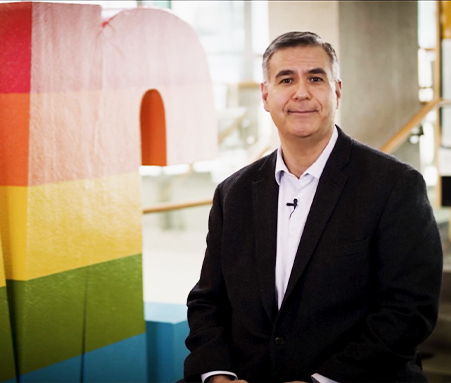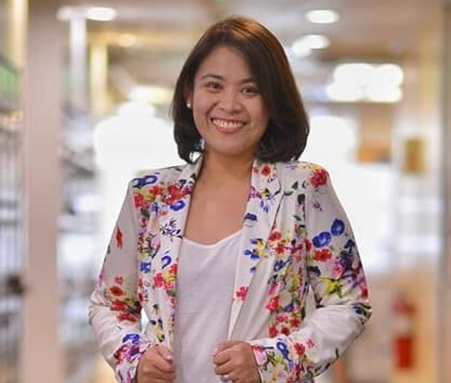)
A Conversation With Crystal Many Fingers
Crystal Many Fingers is Bow Valley College's Learning Design Consultant. Her role has evolved in her five years at the College and now focuses on decolonization and Indigenizing curriculum. Her many personal and professional milestones include being named Bow Valley College's Faculty of the year in 2020 and an appointment to the board of directors for the Calgary Public Library.
Crystal also recently published a children's book called “A'pistotooki kii Ihkitsik Kaawa'pomaahkaa” (Creator and the Seven Animals, why are we here?), which is reaching readers as far away as Germany. Closer to home, the book helps educate Indigenous and non-indigenous children about the importance of education, history, and language.
In Crystal's TEDx talk in March 2020, she talked about how Indigenous and non-Indigenous people can live beside each other in a good way. "That's always been my focus, building bridges between two cultures so we can have positive relationships," she says.
We celebrate Crystal and her many achievements and took time to get to know her better, from her perspective on Indigenization at Bow Valley College, to her education journey, to what resurgence means to her.
Crystal Many Fingers, could you introduce yourself?
I was always taught from the Blackfoot perspective when people ask you who you are, you say: I am Crystal Many Fingers. I'm the daughter of Dr. Helen and Wallace Many Fingers and the mother to Patricia and Alex Soop. I'm an aunt; I'm a sister, a cousin; I'm an adopted auntie. I come from the Kainai First Nation, one of the three Nations of the great Blackfoot Confederacy. I've lived in the City of Calgary Mohkinstsis for over 25 years.
I'm very proud to say I went to the University of Calgary. I started with a Bachelor of Arts and majored in English. And that's when my mom said," You know, you can do that, but you can keep going." So, I got a Bachelor of Education. I came out and said, "I'm going to be the best English teacher." And she said, "No, I think you're already poor. You're used to living at the food bank; You can keep going." So, I went on to get a master's degree in education in adult and workplace learning.
I recently wrote a children's book called A'pistotooki kii Ihkitsik Kaawa'pomaahkaa (Creator and the Seven Animals, why are we here?). It was part of the Blackfoot language series with the Calgary Public Library, and there's a lot of demand for it. The provincial government just asked if they could purchase a number of books to distribute to Blackfoot children in foster care so they can learn their language. That really touched my heart.
Tell me more about what you do at Bow Valley College.
I'm a teacher at heart. I love being with students, and I love talking to them. My role now is with our new learning design team. I call myself "the Indigenizer." My job is to train other learning designers on my team on how to Indigenize the curriculum.
That's what I find challenging. And it's just fun. And when I see students with that look, and they get it, that makes my day because I've inspired that learning, and they get what they're here for.
How has your role changed since you first came to Bow Valley College?
When I started five years ago], one of the first tasks I was given was the Truth and Reconciliation Call to Action Number 24:
"We call upon medical and nursing schools in Canada to require all students to take a course dealing with Aboriginal health issues, including the history and legacy of residential schools, the United Nations Declaration on the Rights of Indigenous Peoples, Treaties, and Aboriginal rights, and Indigenous teachings and practices. This will require skills-based training in intercultural competency, conflict resolution, human rights, and anti-racism."
Our beautiful, wonderful Dean, Dr. Nora McLaughlin, put me into her fold and said, "We're at your disposal, you tell us." There was no template.
Why is teamwork so crucial to what you do at the College?
We want our graduates to be the best applicants for any job they apply for; that's really what we're trying to prepare them for. So as far as teamwork, we all work together, whether we're instructors, program chairs, associate deans, deans, presidents, vice presidents, or board members. We're all here to do one mission. And that's for our learners. They chose Bow Valley College, well, let's make it worth it.
How does the Indigenization of our curriculum help prepare students for their careers?
I talked to a group of nursing students once, just when I started my work at the College. I know that workloads can be heavy, and sometimes students think, "Here's something else I've got to learn; why do I need to learn Indigenous knowledge?"
And I'd say, "Okay, all right, just a second here; what are you going to do when you graduate?" "I'm going to be a nurse." "And how are you going to do that?" "I'm going to go apply to a hospital or health center." "Okay. And what are they going to ask you when you get there?" "I'm going to have a job interview, I guess." "Well, what is the what's one of the questions they're going to ask you? They're going to ask you: 'What do you know about the Truth and Reconciliation Call to Action Number 24?' That applies specifically to you, my learner friend."
Your children's book uses words in English and Blackfoot. Why is language important to you?
Language brings that understanding and that feeling that only unless you understand the meaning. You get it. Some days, when you've had a really bad day, and you feel like the world's beating you up, and you want to lash out, you just think, "No, what was one of the values I was taught?" And I always think of Dr. Reggie Crowshoe, who's at the U of C. He says,”Kimmapipitsin” (Be Kind). And I think," Okay, I know what that is." Just saying one word, you get it. It changes you.
When the kids, including my parents, were taken away from their parents by the Indian agent and the RCMP to residential schools, they severed their connection to their land, culture, and language.
Because the residential school system was programmed in her, she said, "No, you're not going to learn your Blackfoot language, you're going to learn English." And that's what happened.
But you can't change the past. I look at a positive note; it's about resurgence of language of culture. Let's bring that back.
What does resurgence mean to you?
I was pretty much raised off the reserve in the provincial school system. When I was in grade three, we moved to the city of Lethbridge. And I was the only native kid in the school. So, I never knew the history. I didn't even know what a residential school was until grade 12. My mother never talked about it.
I had a very good professor by the name of Tom King. Yes, that Tom King who wrote Inconvenient Indian. He said, "Do you know your history? Do you know any of this?" No, we never learned this in high school. And I think that's when he opened that jar. And everything just came out. I want to know more. I want to learn. I want to know what happened. I heard about Canada's dark history. But I thought, this can't be it, there's got to be positive.
I talked to a good, good friend of mine, who's a colleague here, and he said, "If we look at resurgence, we think about downtown. We're at Bow Valley College, and we're standing there waiting on the street for the bus. And you happen to look down on the sidewalk, and there's a crack in the sidewalk. A flower is just starting to get past that concrete; it's breaking through. Look at it. How could that little bud make it through the concrete? That represents the resurgence of language and culture, despite the colonization of our people – that foundation of cement." It gives you a positive outlook that, yes, it can happen. If that little flower can do it, then our people can do that to.
Can you tell me about the women in your life who inspire you?
I was raised by a single mom who started as a janitor and went on to get her university degree, despite her second language being English. She was a Blackfoot speaker first. So when she was in university, she'd had to translate everything she read into Blackfoot so that she could understand. Her major was classical music, so as a young girl, that's all I heard, Beethoven. She eventually got the Order of Canada in the year 2000.
Having that role model, and now knowing all the stuff that she had to experience as a young child, seeing her four brothers being taken away by the Indian agent and the RCMP and taken to residential schools. There's so much depth that goes into that, and I try to empathize with some of the stuff she went through.
And I tried to understand why she was never nurturing as a mother. She was raised by nuns, so she was very stoic. I knew she loved me, but she couldn't show affection. Now I'm not afraid to tell my daughter, I love you, you're doing good, and proud of you; way to go. I never had that. But you know, it'll come, the healing will come.
I was a young mother, and my daughter dropped out of high school for various reasons. She went back to Bow Valley College for Indigenous upgrading, and she changed her life. She went from being a high school dropout to finishing her diploma in human resources. Now she works for Indigenous relations for Atco. It's just a matter of setting an example.
March is Indigenous Awareness Month. How can we work to avoid tokenism?
I think just recognizing that it, unfortunately, does exist. Like in nursing, I said no, you don't just take the one course – this knowledge needs to be embedded throughout the program. There shouldn't be any tokenism. People have quoted me for saying, "Let's not do the beads and feathers thing." Let's do it all year, let's show them the history. Let's give them the real foundational depth, not just the tip of the iceberg. Let's do the whole bottom. That's the only way people will understand. And I think we're doing a good job here on the academic side. It's happening in all our schools. I have an excellent team of colleagues in Learning Design and an awesome Associate Dean and Dean.
I've told faculty not to be reluctant; there's no such thing as a dumb question. I'm here to help you understand. And they get it. The foundation of working with Indigenous people is the relationship, build a trusting, respectful, reciprocal relationship. Let's get along. Let's trust each other. I'll listen to you; you'll listen to me. We'll move forward, and we'll do the best job. It shouldn't be one-sided.




